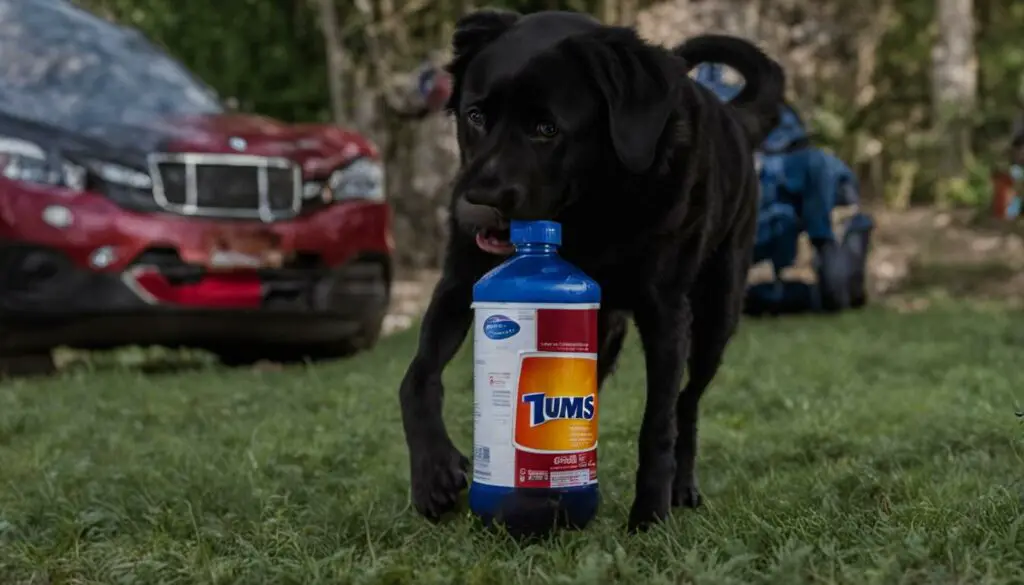As pet owners, we always want the best for our furry friends, including their health and well-being. But when our dogs experience digestive issues like an upset stomach, we may wonder if there are safe and effective over-the-counter remedies we can give them. One common question that arises is, “Can I give my dog Tums?”
Tums are a popular choice for humans when it comes to alleviating heartburn, acid reflux, and indigestion. They contain calcium carbonate, which helps neutralize stomach acid. But what about dogs? In this article, we will delve into the topic of giving Tums to dogs, discussing their safety, dosage, and alternative options for treating dog digestive problems.
Key Takeaways:
- Giving Tums to dogs should be done under veterinary supervision.
- Tums can be safe for dogs in appropriate amounts, but overuse can lead to imbalances and interactions with other medications.
- Consult with your veterinarian for advice on treating your dog’s upset stomach and explore other options such as prescription antacids or home remedies.
- It is crucial to prioritize your dog’s health and well-being by seeking professional guidance for any digestive issues they may be experiencing.
- Always remember that what may be safe and effective for humans may not necessarily be the same for our furry friends.
What Are Tums?
Tums are an antacid medication that contains calcium carbonate as the active ingredient. Calcium carbonate is a naturally mined material found in chalk, marble, and limestone. It is commonly used in humans to neutralize stomach acid and provide relief from heartburn, acid reflux, upset stomach, and indigestion. When chewed and swallowed, Tums works by quickly neutralizing esophageal acid.
Tums with calcium carbonate in it are a popular choice for treating heartburn, acid reflux, and upset stomach in humans. The calcium carbonate present in Tums acts as an antacid, providing quick relief by neutralizing excess stomach acid. Tums can also help alleviate indigestion and provide temporary relief from symptoms such as burning sensation, bloating, and discomfort in the stomach.
The use of Tums for digestive problems in humans is well-documented. However, it is essential to note that Tums are designed for human use and may not have the same effects or safety profile in dogs. Before giving Tums to your dog, it is crucial to consult with your veterinarian to ensure it is the appropriate treatment option and to determine the correct dosage based on your dog’s size and condition.

Remember, while Tums can be safe for dogs in appropriate amounts, prolonged or excessive use can lead to complications. Furthermore, Tums may interact with certain medications your dog may be taking, so it is essential to seek professional advice. In the next section, we will explore the safety of giving Tums to dogs and discuss the potential side effects and precautions to consider.
Can I Give My Dog Tums?
Yes, you can give your dog Tums, but it is essential to consider the safety and potential side effects. While Tums are generally safe for dogs in appropriate amounts, giving them too much or for an extended period can lead to elevated blood calcium levels and mineral imbalances. Additionally, Tums can interfere with the absorption and effectiveness of certain medications. It is crucial to consult with your veterinarian before giving Tums to your dog, especially if they are on other medications.
Potential Side Effects of Tums in Dogs
When giving Tums to dogs, it is important to be aware of the potential side effects. While rare, dogs may experience adverse reactions such as constipation, increased thirst, increased urination, or changes in appetite. In some cases, dogs may also exhibit symptoms of hypercalcemia, including muscle weakness, lethargy, vomiting, or loss of appetite. If your dog experiences any of these symptoms, it is essential to contact your veterinarian immediately.
Interactions with Other Medications
Tums can interact with certain medications, reducing their effectiveness or causing potential harm. It is crucial to inform your veterinarian about any medications your dog is currently taking before giving them Tums. Medications that may interact with Tums include antibiotics, antifungal drugs, and certain heart medications. Your veterinarian can provide guidance on the appropriate timing and dosing of Tums to avoid any potential interactions.
| Potential Side Effects of Tums in Dogs: |
|---|
| Constipation |
| Increased thirst |
| Increased urination |
| Changes in appetite |
| Symptoms of hypercalcemia |
Remember, while Tums can provide temporary relief for digestive issues in dogs, it is important to address the underlying cause of your dog’s symptoms and explore other treatment options. Your veterinarian is the best resource for determining the appropriate course of action and ensuring the health and well-being of your furry friend.
Can Tums Help Dogs?
When it comes to treating dog digestive problems, many pet owners wonder if Tums can be a safe and effective solution. While Tums are primarily marketed for humans, they can potentially provide relief for certain medical conditions in dogs. However, it’s important to note that Tums should only be used under veterinary supervision and on a short-term basis.
One medical condition in dogs that can be treated with Tums is low blood calcium levels. Dogs with this condition may require additional calcium supplementation, and Tums can help regulate their calcium and phosphate levels. Additionally, Tums may also be prescribed to dogs with kidney disease to aid in maintaining proper mineral balance.
It’s important to remember that Tums should not be used as a long-term solution for dog digestive problems without veterinary guidance. It’s crucial to address the underlying cause of the digestive issues and explore other treatment options. Consulting with a veterinarian will ensure that the appropriate dosage of Tums is administered and that the treatment plan is tailored to your dog’s specific needs.
Medical Conditions in Dogs That Can Be Treated with Tums:
- Low blood calcium levels
- Kidney disease
| Pros: | Cons: |
|---|---|
| Can help regulate calcium and phosphate levels in dogs with low blood calcium | Should only be used on a short-term basis |
| May aid in maintaining proper mineral balance in dogs with kidney disease | Not a long-term solution for digestive problems |
It’s always best to consult with a veterinarian before giving any medications, including Tums, to your dog. Your vet will be able to assess your dog’s specific health condition and provide guidance on the most appropriate treatment options for their digestive problems.

Can Tums Be Toxic to Dogs?
While Tums are generally safe for dogs, it’s important to be aware of the potential for toxicity if consumed in excessive amounts. If a dog ingests too many Tums, it can lead to various symptoms of toxicity. These symptoms may include vomiting, electrolyte imbalances, diarrhea, constipation, drooling, tremors, difficulty breathing, or even collapse. Therefore, it’s crucial to be cautious and prevent dogs from consuming an overdose of Tums.
If you suspect that your dog has ingested an excessive amount of Tums, it’s important to take immediate action. Contact your veterinarian or a pet poison hotline right away for advice on how to proceed. They will be able to guide you on the necessary steps to ensure your dog’s safety and well-being. Remember, swift action can make a significant difference in minimizing any potential harm caused by Tums toxicity.
| Symptoms of Tums Toxicity in Dogs | Actions to Take |
|---|---|
| Vomiting, diarrhea, or constipation | Contact your veterinarian or pet poison hotline for guidance |
| Drooling, tremors, or difficulty breathing | Seek immediate veterinary attention |
| Electrolyte imbalances or collapse | Follow veterinary advice and treatment recommendations |
Remember, prevention is key when it comes to Tums toxicity in dogs. Ensure that Tums are stored securely and out of reach of your furry friend. By taking these precautions and staying vigilant, you can help keep your dog safe and avoid any potential harm associated with Tums ingestion.

Precautions When Giving Tums to Dogs
When it comes to giving Tums to dogs, it’s important to take certain precautions to ensure their safety and well-being. Here are some key considerations:
- Read the label: Before giving Tums to your dog, carefully read the label to ensure that the product does not contain any harmful ingredients, such as xylitol. Xylitol is a sugar substitute that can be toxic to dogs and should be avoided.
- Allergies to Tums: Some dogs may have allergies or sensitivities to the food dyes present in colored Tums. To minimize the risk of adverse reactions, it is best to stick to white, unflavored Tums that do not contain any artificial colors or flavors.
- Avoiding Tums in puppies: It is generally recommended to avoid giving Tums to puppies or young dogs. Their growing bones and calcium levels are delicate, and introducing additional calcium supplementation without proper veterinary guidance may disrupt their development.
Remember that Tums should only be used on a short-term basis and under the guidance of a veterinarian. Your veterinarian is the best resource for determining if Tums are appropriate for your dog’s specific digestive issues and can provide further guidance on dosage and duration of use.

Table: Common Allergens in Colored Tums
| Allergen | Description |
|---|---|
| Red dye | A synthetic coloring agent that may cause allergic reactions or sensitivities in some dogs. |
| Yellow dye | A color additive that has been associated with allergic reactions and sensitivities in certain dogs. |
| Blue dye | A food coloring that may trigger allergies or sensitivities in dogs with a predisposition to react to artificial additives. |
Ensuring the safety of your dog is crucial when deciding to give Tums. Always consult your veterinarian to determine the best course of action for your furry friend’s digestive health.”
Tums Alternatives: How to Treat Dog Digestive Problems
If you’re looking for alternatives to Tums or want to explore additional treatment options for your dog’s digestive problems, there are several options to consider. Here are some effective alternatives that you can try:
1. Nightly Snack:
Add a small, easily digestible snack to your dog’s nightly routine. This can help prevent early morning vomiting and provide some relief for an upset stomach. Some suitable options include boiled chicken or pumpkin puree.
2. Bland Diet:
Withhold regular food for a short period and try a bland diet consisting of boiled chicken and rice. This can help soothe the stomach and provide relief from digestive issues. Remember to consult with your veterinarian before making any dietary changes.
3. Acid-Reducing Medications:
If your dog’s digestive problems persist, consult your veterinarian for other acid-reducing medications that are specifically formulated for dogs. These medications can provide better relief for upset stomachs and are tailored to meet the needs of your furry friend.
4. Dietary Changes:
Based on your veterinarian’s recommendations, you may need to make dietary changes to address your dog’s digestive problems. This can involve switching to a high-quality, easily digestible dog food or avoiding certain ingredients that may be causing gastrointestinal issues.
Remember, it is always crucial to seek veterinary advice for persistent or serious digestive problems in dogs. Your veterinarian knows your dog’s medical history and can provide personalized recommendations for their specific needs. By exploring these alternatives and working closely with your vet, you can effectively treat your dog’s digestive problems and ensure their overall well-being.
| Alternative Options | Description |
|---|---|
| Nightly Snack | Add a small, easily digestible snack to your dog’s nightly routine to prevent early morning vomiting. |
| Bland Diet | Try a diet consisting of boiled chicken and rice to soothe the stomach and provide relief from digestive issues. |
| Acid-Reducing Medications | Consult your veterinarian for acid-reducing medications specifically formulated for dogs. |
| Dietary Changes | Make dietary changes based on your veterinarian’s recommendations to address your dog’s digestive problems. |
Remember, always consult with your veterinarian before making any changes to your dog’s diet or administering any medications.
Antacids for Dogs: Exploring Safe Options
When it comes to treating dog upset stomach, antacids can provide relief by reducing stomach acid and soothing gastrointestinal discomfort. While Tums, which contain calcium carbonate, can be used for dogs in appropriate amounts, there are other safe antacid options specifically formulated for dogs. These veterinary-prescribed antacids offer targeted relief and are tailored to meet the unique needs of our furry friends.
Using antacids to treat dog upset stomach can be a viable solution, especially when prescribed and monitored by a veterinarian. These specialized antacids are designed to address the digestive problems dogs may experience and can provide better outcomes compared to over-the-counter options like Tums. It is important to consult with your vet to determine the appropriate antacid and dosage for your dog based on their specific condition and needs.
To give you an idea of some safe antacid options for dogs, here is a table summarizing a few commonly used veterinary-prescribed antacids:
| Antacid | Active Ingredient | Administration | Common Side Effects |
|---|---|---|---|
| Gastrogard | Omeprazole | Oral paste or tablets | None reported |
| Pepcid | Famotidine | Tablets or injectable | Mild diarrhea or constipation |
| Ranitidine | Ranitidine | Tablets or injectable | None reported |
It is important to remember that even though these antacids are considered safe, they should still be used under veterinary guidance. Your veterinarian will evaluate your dog’s specific condition and provide the most suitable antacid option, taking into consideration factors like dosage, potential interactions with other medications, and any underlying health issues.
So, if your dog is experiencing an upset stomach, don’t hesitate to reach out to your veterinarian and explore safe antacid options tailored to your dog’s needs. With the right treatment, you can help your furry friend find relief and get back to wagging their tail in no time!
What Can I Give My Dog For Upset Stomach?
If your dog is experiencing an upset stomach, there are several home remedies that you can try to provide them with relief. One option is Pepto Bismol, which can help with mild vomiting, gas, and diarrhea. However, it is important to consult your veterinarian to determine the appropriate dosage for your dog based on their size and condition.
Another effective remedy is a plain diet consisting of boiled chicken and white rice. This bland combination can help soothe your dog’s stomach and promote digestion. It is important to offer small and frequent meals to prevent overeating and further discomfort.
Note: Always consult your vet before administering any medications or home remedies to your dog.
| Home Remedies for Dog Upset Stomach | Key Benefits |
|---|---|
| Pepto Bismol | – Helps with vomiting, gas, and diarrhea – Consult with your vet for dosage |
| Plain Diet (Boiled Chicken and White Rice) | – Soothes the stomach and aids digestion – Offer small and frequent meals |
“Home remedies like Pepto Bismol and a plain diet can provide effective relief for your dog’s upset stomach. However, it is essential to consult your veterinarian for proper guidance and ensure the remedies are suitable for your dog’s specific condition.”
What Can I Give My Dog For Gas?
If your dog is experiencing gas, there are natural remedies that can help relieve their discomfort. One option is yogurt, which can soothe the digestive system and reduce gas. Make sure to choose plain, sugar-free yogurt to avoid any potential harmful ingredients. You can add a spoonful of yogurt to your dog’s food or serve it as a separate treat.
Another remedy is to provide your dog with a plain diet consisting of easily digestible foods like boiled chicken and rice. This can help alleviate gas and provide relief to your furry friend. It is important to avoid feeding them gas-inducing foods such as beans, broccoli, cabbage, or dairy products.
Remember that each dog is different, so it is essential to observe their reactions and consult with a veterinarian for guidance. They can provide personalized recommendations based on your dog’s specific needs and health condition.

Table: Foods to Avoid for Dogs with Gas
| Foods to Avoid | Reason |
|---|---|
| Beans | High in complex sugars that are difficult to digest |
| Broccoli | Contains sulfur compounds that can cause gas |
| Cabbage | Can produce gas and bloating in some dogs |
| Dairy Products | Dogs may have difficulty digesting lactose, leading to gas |
By incorporating these natural remedies and avoiding gas-inducing foods, you can help relieve your dog’s gas and improve their overall comfort. Remember to consult with a veterinarian for proper guidance and to rule out any underlying health issues that may be causing excessive gas.
Can I Give My Dog an Antacid Tablet Safely?
When it comes to addressing mild stomach problems in dogs, antacid tablets can be a potential solution. However, it is crucial to prioritize your dog’s safety and consult with a veterinarian before administering any medications. The safety of antacid tablets for dogs depends on various factors, including the specific medication and your dog’s individual health condition.
Before giving antacid tablets to your dog, it is essential to understand the appropriate dosage. Dosage recommendations will vary based on your dog’s weight and the specific antacid medication being used. It is crucial to follow your veterinarian’s guidance regarding the correct dosage, as giving too much or too little can have adverse effects on your dog’s well-being.
While antacid tablets containing calcium carbonate, similar to Tums, can address mild stomach problems in dogs, they should only be used on a minimal and infrequent basis. For long-term or persistent digestive problems, it is important to seek veterinary advice and explore other treatment options that may be more suitable for your dog’s specific condition.
Remember, the health and well-being of your furry friend should be your top priority. Always consult with a veterinarian for professional advice before giving any medications to your dog, including antacid tablets. Veterinary guidance will ensure that you are making the safest and most appropriate choices for your dog’s digestive health.
Example of a Table:
| Antacid Tablet | Safety for Dogs | Recommended Dosage |
|---|---|---|
| Antacid Tablet A | Safe for dogs in appropriate amounts | 1 tablet per 20 pounds of body weight, once daily |
| Antacid Tablet B | Not recommended for dogs | N/A |
| Antacid Tablet C | Moderate safety for dogs, potential side effects | Consult with a veterinarian for customized dosage |
Table: Safety and recommended dosage for select antacid tablets in dogs.
Dog Upset Stomach: How to Help Your Furry Friend
If your dog is experiencing an upset stomach, it’s important to take steps to provide them with relief and support their well-being. Identifying the signs and causes of a dog’s upset stomach can help you determine the best course of action. Whether it’s a mild case of indigestion or a more severe digestive issue, seeking veterinary advice is crucial to ensure proper diagnosis and treatment.
Some common signs of a dog’s upset stomach include vomiting, diarrhea, loss of appetite, abdominal pain, and excessive gas. If you notice any of these symptoms, it’s essential to monitor your dog’s condition and consult with your veterinarian if the symptoms persist or worsen. They can evaluate your dog’s overall health and provide specific guidance based on their individual needs.
When seeking veterinary advice for a dog’s upset stomach, your veterinarian may recommend dietary changes, medication, or other treatment options. They can provide you with a tailored plan to address the underlying cause of the upset stomach and alleviate your dog’s discomfort. It’s important to follow their recommendations and avoid self-medicating your dog with over-the-counter remedies without professional guidance.
In summary, helping dogs with upset stomachs requires proper identification of symptoms, seeking veterinary advice, and following the recommended course of action. By prioritizing your dog’s well-being and consulting with a professional, you can provide the necessary support to help your furry friend recover and maintain a healthy digestive system.

Table: Common Causes of Dog Upset Stomach
| Cause | Symptoms |
|---|---|
| Poor Diet | Vomiting, diarrhea, loss of appetite |
| Food Intolerances or Allergies | Itchy skin, vomiting, diarrhea, gas |
| Bacterial or Viral Infections | Vomiting, diarrhea, fever, lethargy |
| Stress or Anxiety | Loss of appetite, digestive upset |
| Pancreatitis | Vomiting, diarrhea, abdominal pain |
Conclusion
As a responsible pet owner, ensuring the health and safety of our furry friends is our top priority. When it comes to treating dog digestive problems, it’s natural to wonder if giving Tums is a viable option. While Tums can be given to dogs in appropriate amounts, it is always best to consult with a veterinarian before administering any human medications to your pet.
Dog health and safety should not be taken lightly. While Tums can provide temporary relief for dogs with upset stomachs, it is important to remember that they should only be used on a short-term basis and under veterinary supervision. Your veterinarian can provide specific guidance based on your dog’s individual needs and health condition.
When it comes to treating dog digestive problems, there are alternative options to consider. Consulting with your veterinarian can help you explore safer and more effective treatment options tailored specifically for dogs. Whether it’s veterinary-prescribed antacids or home remedies, seeking professional advice ensures that you are making the best decisions for your dog’s well-being.
In conclusion, while it may be tempting to give Tums to your dog, it is always best to consult with a veterinarian. By prioritizing your dog’s health and safety, you can provide them with the appropriate care and seek professional guidance to address their digestive problems effectively.
FAQ
Can I give my dog Tums?
Yes, you can give your dog Tums, but it is important to consider the safety and potential side effects. Consult with your veterinarian before giving Tums to your dog, especially if they are on other medications.
What are Tums?
Tums are antacid tablets that contain calcium carbonate as the active ingredient. They are commonly used in humans to relieve heartburn, acid reflux, upset stomach, and indigestion.
Can Tums help dogs?
Tums may be beneficial for dogs in certain medical conditions, such as low blood calcium levels or kidney disease. However, they should not be used as a long-term solution without veterinary supervision.
Can Tums be toxic to dogs?
Yes, consuming excessive amounts of Tums can be toxic to dogs and can cause vomiting, electrolyte imbalances, diarrhea, constipation, and other symptoms. Contact your veterinarian or a pet poison hotline immediately if your dog ingests too many Tums.
What precautions should I take when giving Tums to dogs?
Read the label carefully, avoid Tums with harmful ingredients like xylitol, stick to white Tums to avoid potential allergies, and do not give Tums to puppies or young dogs. Always consult with your veterinarian.
What are alternative options for treating dog digestive problems?
You can try adding a nightly snack, feeding a bland diet, consulting your vet for other medications, or making dietary changes based on your vet’s recommendations. It is important to seek veterinary advice for persistent or serious digestive issues.
Can I give my dog an antacid tablet safely?
While antacid tablets can be given to dogs in minimal and infrequent amounts, it is important to consult your veterinarian for dosage recommendations based on your dog’s weight and specific needs.
What can I give my dog for an upset stomach?
You can try giving Pepto Bismol in the appropriate dosage as advised by your veterinarian or feeding your dog a bland diet consisting of boiled chicken and white rice. Always consult your vet for proper guidance.
What can I give my dog for gas?
Natural remedies for dog gas include plain, sugar-free yogurt and a plain diet of easily digestible foods like boiled chicken and rice. Avoiding gas-inducing foods and ensuring your dog eats slowly can also help prevent excessive gas buildup.
How can I help my dog with an upset stomach?
First, identify the cause of the upset stomach and consult your veterinarian if it persists or if your dog shows other symptoms of illness. Your vet can provide specific recommendations based on your dog’s needs and health condition.






